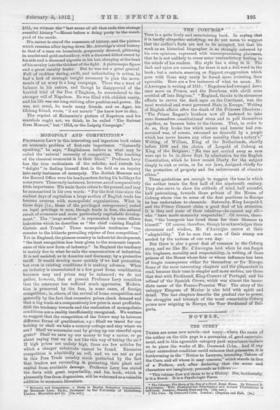MONOPOLY AND COMPETITION.*
Prioresson, Derr in this interesting and ingenious book raises an economic problem of first-rate importance. "Generally speaking," he says, "Englishmen believe in what may be called the ' natural' necessity of competition. The teaching of the classical economist is in their blood." Professor Levy has the true enthusiasm of the scholar, and, records his 4‘ delight " in finding himself first -in the field on an inquiry into early instances of monopoly. The British Mueeum and the Record Office were his headquarters during his holidays for eotne years. These early instances, however, are of comparatively little importance. His main thesis refers to the present, and may be summarized in his own words : " For the first time since the earliest days of capitalism a large section of English trade has become overrun with monopolists' organizations. What in those days [i.e., those of the privileged entrepreneur] rested on legal privilege is now, though trade is free, the natural result of economic and more particularly capitalistic develop- ment." The " large section " is represented by some fifteen industries which be describes as "the chief existing English Cartels and Trusts." These monopolist tendencies "run counter to the hitherto prevailing regime of free competition." Yet in England, the pioneer country in industrial development, 4‘ the least recognition has been given to the economic import- ance of this new form of industry." In England the tendency is mainly due to what he calla the concentration of industries. It is not assisted, as in America and Germany, by a protective tariff. It would develop more quickly if we had protection, but even in existing conditions it is making advance. When an industry is concentrated in a few great firms, combination becomes easy and prices may be enhanced ; we do not gather, however, that at present Professor Levy considers that the consumer has suffered much oppression. Modera- tion is preserved by the fear, in some cases, of foreign competition; in others, of the revival of home competition and generally by the fact that excessive prices check demand and that a big trade at a comparatively low price is most profitable. Still the tendency towards and the realization of monopolistic conditions are a reality insufficiently recognized. We venture to suggest that the competition of the future may be between different forms of gratification, e.g. : Shall we travel for our holiday or shall we take a country cottage and stay where we are P Shall we economize coal by giving up our cheerful open grate P Shall we save up our money to buy a motor, or go about saying that we do not like this way of taking the air P If high prices are unduly high, there are few articles for -which a cheaper substitute cannot be found. Excessive 'competition is admittedly an evil, and we are net as yet in this Free Trade country much perturbed by the fact that. traders are succeeding in protecting their plant and capital from avoidable damage. Professor Levy has stated the facts with great impartiality, and his hook, which is pleasantly free from dogmatism, will be welcomed as a valuable addition to economic literature.
• Monopoly and Competition: a Study in EnpZieh Industrial Orgaritation. B Hermann Levy, Ph.D., Professor in the University of Heidelberg. London: Macmillan and Co. [10s, not.]










































 Previous page
Previous page